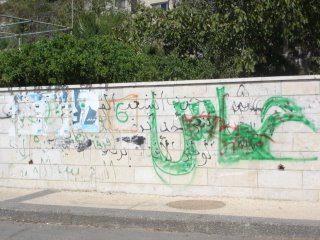
Everywhere around my neighborhood the word "Hamas" is spray-painted in green and the posters of Fatah are defaced. I found that surprising since Birzeit is a moderate and half-Christian town. I've been canvassing the Palestinians I've met about the political situation--a group that includes individuals at a refugee camp we visited, our various guides, and professors and students at school.
Here are some preliminary views I've heard.
1.) Palestinians voted for Hamas, even long-time Fatah members, mainly to "get back" at Fatah for its corruption, mafia-like leadership style, and the fact that the party had done so little for the Palestinians. Some Palestinians, of course, favored Hamas' more militant style, since they believed Fatah's failure made it clear that nothing can be gained by cooperating at every point with the Israelis because it means Palestinians just get taken advantage of. With Fatah, Palestinians saw more of their land taken, more stringent security procedures, more frequent incursions and campaigns into their areas, and finally, being cut off from the world with the wall.
Incidentally, Hamas parliamentarians and ministers are the only ones who have received any salaries the past 6 months. The others have received nada, since the West cut off funding to the PA. The Palestinians with whom I spoke believed the money was coming from Iran and/or Syria, and that it was obvious that Hamas was very well-funded. (I don't quite understand the West's logic. Hamas' ability to "take care of their own" and buy support in a society in serious need of finances will just increase the party's standing. Everyone was outraged about the West's cutting off aid as not hurting Hamas, whom they intended to punish, but hurting the Palestinian people. The Palestinians were not blaming Hamas, but the West, for this worsened condition. We did similarly in Iraq, stood by as the Iranians heavily funded the Shia Islamists parties. Meanwhile, the moderate democrats there pleaded for support and funding and we didn't do anything because we "didn't want to interfere". And we wonder why Islamists won the elections?)
2.) Most saw the two-state solution as the best of the all bad options. "We MUST have our freedom," they all exclaimed. They all agreed living under occupation was like living in a prison and was inhumane and unbearable. A two-state solution would at least give them sovereignty within their areas.
3.) Most believed it just that the "right of return" meant that Palestinians who could prove their land holdings in Israel should be allowed to get their land back or be compensated. However, they were sure a two-state solution would mean compromise on this point and they would be satisfied with the "right of return" for Palestinians outside the territories to return home.
4.) The students I talked to, interestingly, all said that the only way to accomplish these goals was through militant resistance, since past experience had shown Israel would not respond to anything else. I didn't get clear answers from the older folks. (Not a good trend if the youth are getting farther and farther apart, and more and more militant.) The students pointed out that all the parties call for resistance (even leftist parties, such as the PFLP and Communists). There is only one leader (I can't remember his name!) who does not and he is regarded as a buffoon by most Palestinians and has very little support even though he is heavily funded by the EU. I asked the students why smart, moderate individuals like themselves didn't start a party and they laughed. I'm going to keep pressing!
As another aside about students and politics, the Public Relations head officer of Birzeit said the students are extremely politicized. Their student council is voted upon by party: for example, Hamas won the majority of seats on the council last year and Fatah the second highest. I asked if they ever collaborate on activities or if this means that most of their activities are political in nature. He said that they do collaborate on protests about school fees or issues, or against the occupation. However, most issues become political. He did not think that the student groups received financial or other support from the parties themselves. (I find this highly doubtful; this was a big problem in Iraq.)
5.) Gaza is much more radical politically than the West Bank because they are much more economically impoverished and isolated. A girl in our program is Palestinian-German, originally from Gaza, and went there for a while before coming to Birzeit. Her description paralleled Iraq: intermittent electricity and water, daily shootings and killings, very Islamist.
Okay, off to Ramallah to hear a jazz concert. Contrary to the news, Ramallah is a very happening and fun city! Classes start tomorrow... Oh yeah, and I got my first proposal last night from our neighbor (23 and owns a supermarket across the street. Yes, Justin, I refused him, of course! I said he was just a boy and I was way too old for him!)

No comments:
Post a Comment